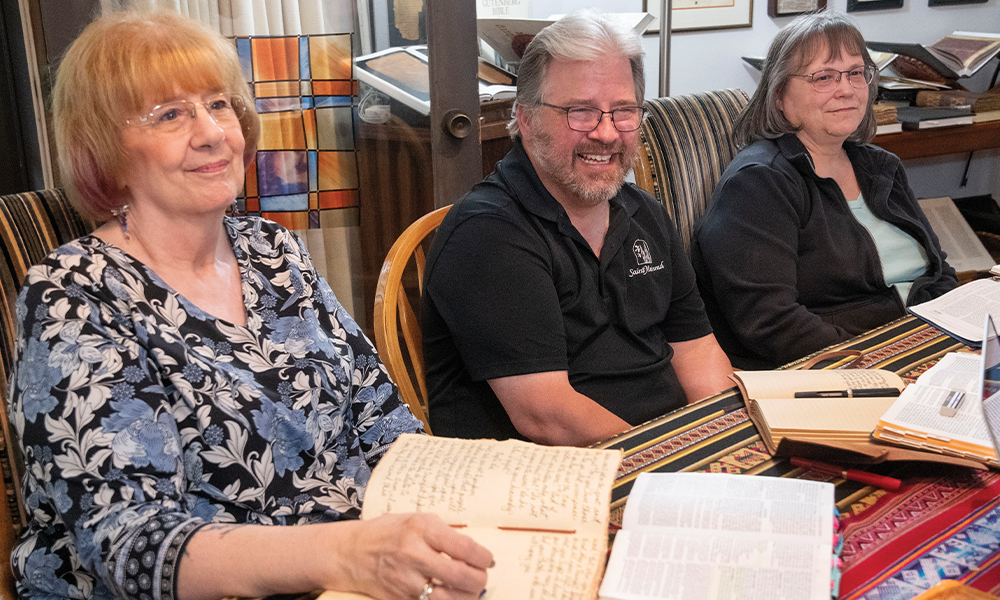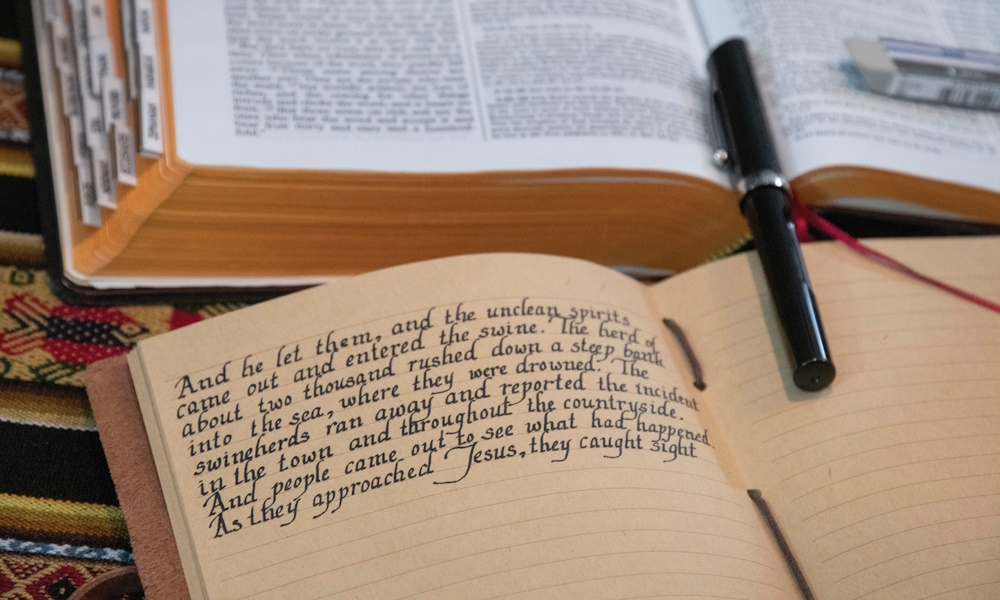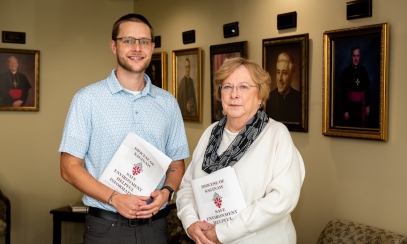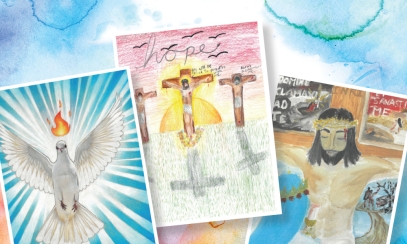
Writing Scripture by hand offers unique prayer experience
On a warm sunny evening in June, a group gathered inside the rectory at All Saints Catholic Church in Bay City sitting quietly, concentrating on the written Word of God; their hands and eyes work together, elbows bent, heads slightly tilted.
On a warm sunny evening in June, a group gathered inside the rectory at All Saints Catholic Church in Bay City sitting quietly, concentrating on the written Word of God; their hands and eyes work together, elbows bent, heads slightly tilted.
At the head of the rectangular dining room table is All Saints’ Parish pastor, Father José Maria Cabrera, whose idea it was to form this unique group – made up of parishioners who he calls: “scribes.” They’re parishioners from around the Saginaw Diocese who were thrilled with the idea of taking books of the Bible and hand writing them into their own journals.
Father José’s idea to start writing books of the Bible began in 2020 during the COVID-19 pandemic.
“Everyone was cleaning out closets. I ran out of closets to clean,” he said, laughing. “It’s kind of a scholarly thing, but I wanted to experience for myself what the ancient scribes experienced. I started hand writing the Gospel of John in Greek.”
“My goal was not to make something beautiful, but to become the hands of God. To sit down and write without thinking,” he explained. “In any other form of prayer, you can put in your 50 cents. In this type of prayer, you’re using your hands, copying the Word of God. It’s larger than yourself. You’re copying a masterpiece.”
Father José decided to share the idea with Saginaw Diocese parishioners while he led retreats, and found that others wanted this hands-on experience, too. The “Bible Scriptorium” was born. (A scriptorium was a writing room in medieval monasteries.)
“People love handwritten notes, scrapbooking or sending someone a personal card or note. This is something similar. It’s special and the books are written all by hand,” he said.
The goal: to write chapters of the Bible by hand in English, and then put them up for display for the public to view.
The works themselves are very personal. Each scribe chooses the book of the Bible, a writing tool and their own type of journal. Flipping through the pages, they reflect on how handwriting changes from day to day depending on how quickly they’re working or what mood they’re in – tired, in a hurry or at peace. The scribes work on their own time, meeting every other month.
When the group meets, they begin with a prayer while relaxing music plays in the background. They write for 40 minutes and then take a break for refreshment and reflection, sharing the experiences they’ve had writing during their time apart.
“You’re surrendering yourself, and you find something beautiful in it,” Father José said.
Somehow reading, writing and translating down on their own paper brings a new meaning to the word of God. Writing by hand allows them to reflect on each word. The scribes all agree that each time they sit down to write, their take away can mean something different, and that it is a prayerful process.
“It’s a perfect way to start the day,” said Kirsten Fortier, a parishioner from Our Lady of Grace in Sanford. “It’s prayerful and I can connect with God.”
Linda Kreager, who attends Christ the Good Shepherd and Cathedral of Mary of the Assumption in Saginaw, chose the Gospel of Matthew. She reflected on writing one of the day’s passages, “Ask and you shall receive.” (Mt. 7:7)
“I needed to read and write that today,” she said. “Each time I sit down to write, I find something different that speaks to me. The words really vibrate and resonate with me.”
Deacon Todd Lovas, director of parish life at St. Vincent DePaul in Shepherd, finds he needs a certain focus writing the Gospel of Mark in calligraphy.
“I find it very calming, and I am able to shut out the distractions from the outside world more readily. It has also made me remember how I first wrote my homilies. After I was first ordained, I would hand write the Gospel reading of the Sunday that I was preparing for, to more intently focus on the words,” he said. “My current writing, with its slow pace, has overlapped (or nearly so) the Sunday Lectionary more than once since beginning.”
Deacon Todd gave up social media during Lent, and has continued time away from it. Writing instead gives him a chance to sit down, concentrate and utilize his time “doing something meaningful,” he said.
Maribeth Hopps of All Saints Parish is writing the Gospel of Luke. She says she finds the writing project “challenging.”
“To sit still and concentrate … There’s so many distractions. To actually focus … to keep my head in it— This is a beautiful challenge,” she said.
For Lisa Briggs of Holy Family Church in Saginaw, the process of writing books from the Bible is a way to make herself slow down. She chose to write the Psalms.
“Every situation and emotion is covered. I always like listening to the responsorial Psalms at Mass — they’re so beautiful and potent. I knew writing them out would be meaningful,” she said. “If I’m just reading the words I realize I can skim through. However, writing out the verses is so intentional and it creates a better pathway from the brain to the heart— simply by writing it out by hand. I find this to be an intense method of concentration, attention to God’s Word, and it allows me to absorb it in a better way than just reading it. Writing it out draws me closer to the Lord.”
The scribes agree that every time they sit down to write verses down in their own handwriting, God speaks to them in a variety of ways.
Father José, who also writes in Greek and Hebrew, says it’s all about the process and not about how it looks.
“We are copying from the ancient scribes’ writings. Their human writings. Though inspired by the Holy Spirit, the human authors — scribes— were humans with flaws, with broken paths, with challenges to holiness. It took courage,” he said. “It left us with something beautiful and extraordinary.”
The scribes’ handwritten journals containing chapters and verses will be displayed and shared with the public as part of Father José’s Bible Museum on Nov. 1-3 at The Valley Plaza Resort in Midland as part of the Lay Ministry Assembly. Along with the handwritten Books of the Bible, Father José’s collection also includes Biblical artifacts that gather 4,000 years of biblical history – copies of the Dead Sea Scrolls, antiques and artwork collections.
For more information, please visit saginaw.org/events.




